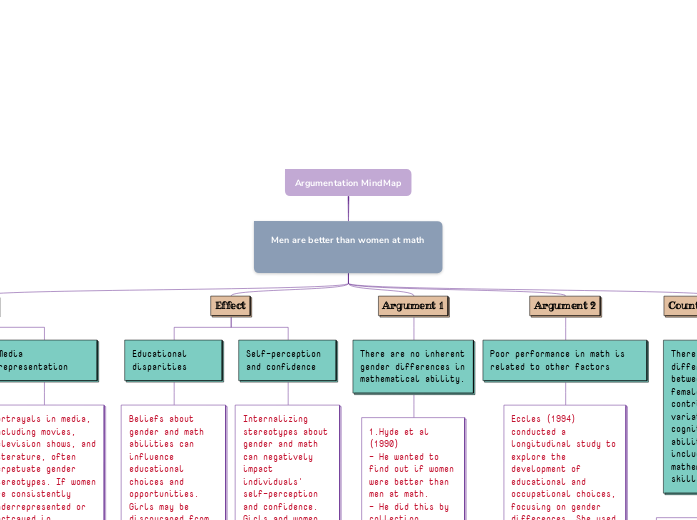Argumentation MindMap
Men are better than women at math
Cause
Stereotypes and cultural norms
Society has stereotypes about gender roles, with certain professions and skills being traditionally associated with one gender or another. These stereotypes can influence perceptions about math abilities, even when they have no basis in reality.
Examples:
- Engineering is for men, nursing is for women.
Media representation
Portrayals in media, including movies, television shows, and literature, often perpetuate gender stereotypes. If women are consistently underrepresented or portrayed in stereotypical roles related to math and science, it can reinforce the belief that these fields are more suited to men.
Examples:
- In "Friends", Monica worked as a cook, Rachel in the fashion industry, but Chandler worked in computing and Ross was an academic.
Effect
Educational disparities
Beliefs about gender and math abilities can influence educational choices and opportunities. Girls may be discouraged from pursuing advanced math courses or STEM-related careers, leading to fewer opportunities for academic and professional growth.
Examples:
- 80% of new entrees in nursing programs are women. in Civil engineering 75% of students are men.
Self-perception and confidence
Internalizing stereotypes about gender and math can negatively impact individuals' self-perception and confidence. Girls and women may develop a lack of confidence in their mathematical abilities, even if they possess the skills needed to excel in these areas.
Examples:
- Only 25% of new students in civil engineering are women.
Argument 1
There are no inherent gender differences in mathematical ability.
1.Hyde et al (1990)
- He wanted to find out if women were better than men at math.
- He did this by collecting different studies that investigated gender differences in mathematical performance.
- Then he combined the results of the studies
- He found that all results agreed that there were no gender differences in mathematical ability.
Argument 2
Poor performance in math is related to other factors
Eccles (1994) conducted a longitudinal study to explore the development of educational and occupational choices, focusing on gender differences. She used surveys, interviews, and observations to gather data and developed a model considering social, cultural, and familial influences. Her research found that cultural and environmental factors significantly impact women's educational and occupational choices, particularly in math-related fields.
Counter argument
There biological differences between males and females that could contribute to variations in cognitive abilities, including mathematical skills.
the overwhelming evidence suggests that environmental, educational, and societal factors play a crucial role in shaping cognitive abilities like mathematical reasoning.
Shirley et al (2015) found that when female students were reminded of gender stereotypes before taking a math test, their performance decreased. This highlights how external pressures and biases can impact cognitive outcomes rather than inherent biological differences.
